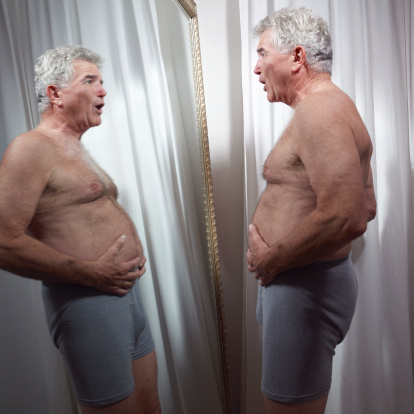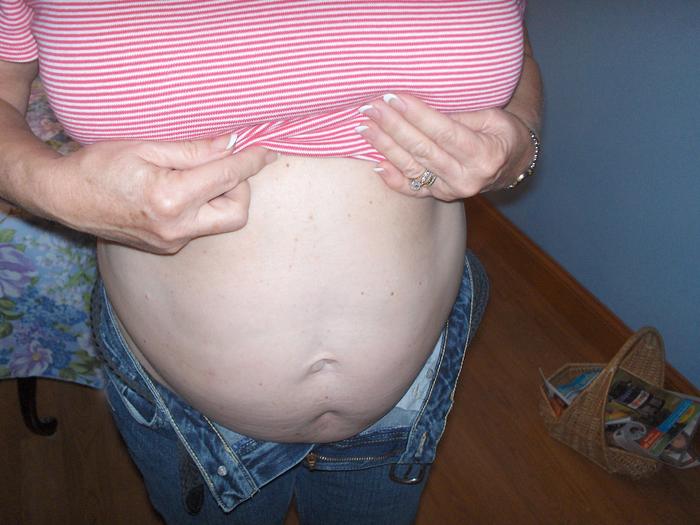Bloating: Symptoms, Cures, Causes & Remedies
Abdominal bloating, also known as meteorism, is a common condition tin which the abdomen feels full and tight. It is a condition that originates in your stomach and seems to travel throughout your body. Virtually everyone has had to endure the uncomfortable feeling of bloating at one point or another since it occurs as a result of your body attempting to break down food for fuel. The feeling of fullness that bloating causes in the stomach is not only uncomfortable but can also be embarrassing as it sometimes results in gas and burping.

Symptoms
The most common symptom of bloating is the feeling of fullness and tightness in the stomach that usually takes place after eating. The medical term used to describe this is dyspepsia.
Other common symptoms of bloating are burping, flatulence, noises in the stomach, decreased appetite and constipation. Symptoms vary in degree from person to person.
Bloat can be much more serious in some than others and, depending on the seriousness and affect it has on daily life, medical attention should be sought to treat it.
Bloating? Get Remedies Fast!
Often times, bloating will result in acid reflux after food consumption and further add to the uncomfortable feeling caused by bloating.
Causes of Bloating
Bloating is a condition that occurs as a result of the bodies inability to break down food properly during digestion. As the body breaks down food, it is broken down into components that then turn into energy and nutrients.
Once all of the energy and nutrients are derived from the food that has been consumed, the additional waste turns into gas. Under normal circumstances, these gases are easily managed by the intestinal tract and released through burping and/or flatulence.
Both burping and flatulence, although embarrassing, are a normal part of the digestion process and work to relieve the possibility of stomach bloat. When these gases are not able to escape the body, they result in the sometimes painful problem known as bloating. Bloating occurs when large pockets of sulphur-bearing gases stretch the stomach and intestinal walls.
While bloating is common and much of the population experiences it often, it can be adjusting your diet, minimizing the intake of foods or beverages that seem to increase bloat and limiting sodium intake.
Some of the common dietary causes of bloat are:
- Soft drinks
- Packaged foods
- Fried foods
- Milk products
- Sugar free foods
- Minimal water intake
- Premenstrual Syndrome (PMS)
- Irritable Bowl Syndrome (IBS)
- Colon Cancer
Soft drinks, including soda and other carbonated beverages, increase bloating because of the carbon dioxide in the bubbles that slow down food breakdown. Packaged foods, cured meats and soups often times have a high sodium content resulting in the body’s inability to release water, therefore aggravating the release of fluids and causing bloat. Milk and milk products cause bloat but they also provide necessary nutrients to the body.
In addition to dietary reasons, bloating is also caused by common some medications, conditions and diseases. The contraceptive pill, Crohn’s disease, Colon cancer and IBS are all common causes of bloating as well.
Prevention Tips
While soft drinks, packaged foods, dairy products, sugar-free foods and certain vegetables may increase bloating, many of these products also provide certain health benefits so they should not be entirely eliminated from a diet.
Packaged foods often contain high amounts of sodium, however, they are a good option for lunch or dinner on the run when compared to some of the high fat fast food options available. When there isn’t enough time to prepare a fresh, healthy lunch or dinner, a packaged meal such as a Lean Cuisine or canned soup, would be a much healthier option than typical fast food options available.
Milk & Dairy
Milk and milk products are also common culprits of bloat but, at the same time, contain nutrients that the body needs. An individual looking to decrease bloating could substitute some or all dairy products consumed with soy milk and other lactose-free options. There are also dairy options containing smaller amounts of lactose such as frozen yogurt and aged cheeses.
Sugar Free Foods
With the high rate of obesity in the United States and increased risk of diabetes, sugar free foods have become a more common ingredient in foods. Sorbitol, Xylitol, Maltitol and Erythritol are all common ingredients used in sugar-free foods and diabetic diet staples. These sweeteners are naturally-occurring sugars that are added to food and beverages to make them sweeter without the added calories of sugar.
When these sugars are broken down in the body by the large intestine, it results in gas causing excess bloating. Foods containing these ingredients should be consumed at a minimum, if at all possible, since they cause excessive gas and, at times, diarrhea.
Drinking Water
Another misconception is that drinking too much water causes one to be bloated. Many people assume that, the more water they drink, the more bloated they will feel. Just the opposite is true. Drinking more water will alleviate bloating and water retention because it will help the body flush out the excess sodium. Women also tend to regularly complain of bloat in the days or week prior to their menstrual cycle because of the body’s tendency to retain fluid during this time.
Adjusting Your Life Style
General prevention tips for bloat also include changing not only the foods you eat but the way you eat. Eating more frequent, smaller meals throughout the day can help in avoiding the feeling of fullness that’s associated with bloat. Eating slowly and drinking plenty of fluids can also help with digestion and minimize gas.
In addition to adjusting diet and nutritional needs, seeing a doctor to help with other medical conditions may also help prevent bloat. Irritable Bowel Syndrome and Colon cancer are two common causes of bloating and should not be left untreated. Treating IBS may be a solution in completely eliminating bloating all together.
IBS
IBS is a problem in the colon consisting of irregularities in the digestive process and, most commonly, associated with constipation. Some common remedies to IBS are increasing fiber intake and drinking more water. Avoiding coffee, cigarettes and spicy foods could also decrease the symptoms of IBS, therefore, improving bloating.
Colon cancer and other problems in the colon cause serious bloating problems as well because the colon is the major part of the digestive system. Getting a colonoscopy can provide early detection of colon cancer and can give a patient insight as to what may be some of the factors contributing to the bloating.
Risk Factors
In general, bloating is not a serious condition that causes many health risks. It is a problem that much of the population endures as a result of certain eating habits, medications taken and/or medical conditions. One of the potential risk factors that could be associated to bloating is confusing symptoms of bloating with those of more serious conditions, such as a heart attach or stroke.
If it is suspected that symptoms may indeed be the cause of something more serious and possibly not from excess gas or bloating, they should not be ignored and an individual should seek medical attention immediately.
Natural Treatment Options & Remedies
There are a variety of ways that bloat can be treated and, often times, even eliminated. Dietary and lifestyle changes can make significant changes in the way the body digests foods. Probiotics, a good bacteria found in most yogurts, can help relieve symptoms. The active bacteria in yogurt and probiotics produce lactase and can supplement the body’s on levels of this enzyme. This will lead to increased regularity, resulting in less gas and bloating.
Changing Up Your Diet
Changing your diet is one of the easiest ways of relieving bloating. In general, those that suffer from bloating often should minimize their intake of foods high in carbohydrates and soluble fiber. Foods containing carbohydrates and/or soluble fiber tend to cause the body to retain a lot of water, increasing the feeling of being uncomfortable associated with bloating. They are not easily digested and, the amounts not completely digested cause gas in the large intestine.
Foods that are easily broken down by the large intestine and help minimize bloat are lean beef, fish and white meat poultry. In addition, consuming vegetables that are considered to be good sources of insoluble fiber such as spinach, romaine lettuce, green beans, kale and other leafy greens will also help. Reducing the intake of refined carbohydrates in conjunction with increasing the consumption of protein and vegetables will have a significant effect in reducing bloating.
Antacid Relief
Active charcoal supplementation and Pepto-Bismol are also options. Active charcoal is also sometimes taken before or after eating to prevent gas. It will usually at least reduce the amount of gas produced during digestion. A negative affect of this treatment option, however, is that it may cause constipation. Pepto-Bismol or any other generic option to it containing Bismuth will also relieve bloating.
Taking it before or after a meal will reduce swelling caused by food allergies and neutralize the odor of gas. It’s a great option and it’s 100% natural. Peppermint oil has also been praised as a natural alternative remedy for bloating. Drops can be added to warm beverages such as green tea after a large meal.
Keeping Track of Progress
Keeping a food diary may also help minimize bloat. This method can help identify foods that trigger bloat as well as identify foods that relieve it. Eliminating foods one by one that lead to bloat can help narrow down the list of dietary changes that need to be made. In addition, this method can also keep track of foods that do or do not improve bloating.
Stress & Exercise
Stress is another common culprit of bloating. Relieving stress through relaxation, massages, acupuncture and aromatherapy can help. A heating pad or a hot bath may also ease the discomfort of bloating and stress at the same time. Placing a heating pad on top of the abdomen while lying down will ease stomach gases.
Exercise is another method that will relieve bloat.
Although exercise can be uncomfortable when bloated, it can improve digestion and stress levels. In general, individuals should aim for a minimum of 30 minutes of exercise per day. Walking, jogging, swimming, yoga and pilates are all options that will alleviate symptoms.
Medical Treatment Options & Remedies

In addition to natural remedies, there are also several options in bloating medicine and gas medication.
For those that are resistant to changing their diets, this may be the only option to reduce bloating.
Gas-x, Beano, Flatulex and other remedies containing polyethylene glycol and simethicone are all options that provide bloating relief.
Alka-seltzer is also a common remedy for relief after a large meal.
All of these options are low in cost and available over the counter without a prescription.
If bloating and gas are causing more pain than is bearable and/or the over the counter medications do not help, a physician can prescribe stronger medication.

3 Comments
nice suggestion
Does that person have two bellybuttons
Wow, I thought it was just me but that’s what I thought as well! It does look like there are two bellybuttons.